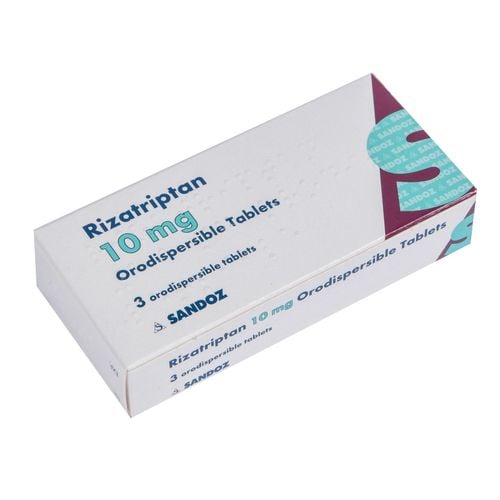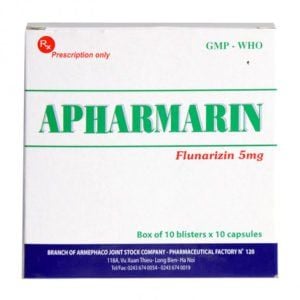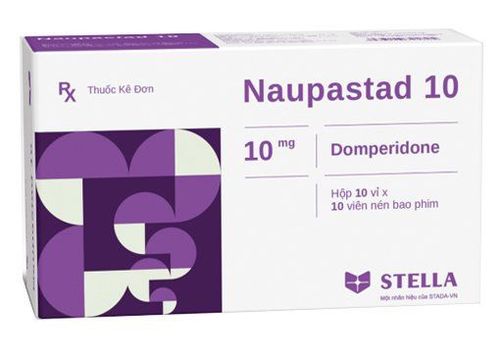This is an automatically translated article.
If you're vomiting, it's usually because your body is trying to get rid of germs or some other toxin. Vomiting may occur once or may continue for a while. So antiemetic drugs when put into the body harmful or beneficial? Find out through the article below.1. What is an antiemetic?
Antiemetics are prescription drugs used to treat patients with nausea and vomiting as side effects of other medications. You can tell if nausea and vomiting are side effects if you start experiencing them soon after starting treatment with a new medicine. They are often used in patients undergoing chemotherapy and radiation therapy.Antiemetics can also be used to treat infections, severe cases of gastroenteritis, and vomiting (severe morning sickness) during pregnancy. These may include antihistamines, serotonin antagonists, dopamine antagonists, corticosteroids, NK1 receptor antagonists, benzodiazepines, or other agents. Common antiemetics include Emetrol, Dramamine, bismuth sub salicylate, and Bonine.
Although they can be used to treat pediatric and adult patients, talk to your doctor about your options if the patient is a child. Some antiemetics should not be given to children 12 years of age or younger.
If nausea or vomiting is accompanied by fever, jaundice, bleeding or abdominal pain, tell your doctor right away. This could be a sign of a more serious underlying medical condition.
2. What is Nausea and Vomiting?
Nausea and vomiting are common conditions. Nausea is the unpleasant feeling of wanting to vomit, and vomiting is the forceful expulsion of stomach contents.Nausea and vomiting are common and usually not serious. However, a healthcare provider should be contacted immediately if the following occur:
Vomiting for longer than 24 hours. Blood in vomit (also called regurgitation). Severe abdominal pain. Severe headache and stiff neck. Signs of dehydration, such as dry mouth, infrequent urination or dark urine
3. Causes of Nausea and Vomiting
There are many potential causes of nausea and vomiting, such as:Morning sickness during pregnancy. Gastroenteritis and other infections. Migraine headache . Travel sickness. Food poisoning . Side effects of medications, including those used to treat cancer. Bowel obstruction . Poisoning or exposure to a toxic substance. Diseases of other organs (heart, kidney or liver). Treatment of nausea and vomiting should be tailored to the cause. There are a number of drugs that act on different nerve receptors that, when used, can treat nausea and vomiting. For severe cases of vomiting, intravenous fluids may also be needed to treat the accompanying dehydration.
4. Antiemetic drugs
Some antiemetics are taken orally. Others are available as injections or as patches on your body so you don't have to swallow anything. The type of antiemetic you should take depends on the cause of your symptoms:4.1. Group of antiemetic drugs for motion sickness
Antihistamines to prevent nausea and vomiting caused by motion sickness are available over the counter. They work by keeping your inner ear from fully sensing movement and include: Dimenhydrinate, Meclizine.4.2. Antiemetics for stomach flu
Stomach flu, or gastroenteritis, is caused by a virus or bacteria. The over-the-counter bismuth-subsalicylate works by coating the lining of your stomach. You can also try OTC sugar, fructose, or phosphoric acid.4.3. Antiemetics for chemotherapy
Nausea and vomiting are a common part of chemotherapy treatment. Antiemetics are used before and after chemotherapy to prevent symptoms.4.4. Group of antiemetic drugs for surgery
Nausea and vomiting after surgery can be caused by the anesthesia used during surgery. Prescription drugs used for treatment include:Serotonin 5-HT3 receptor antagonists: Dolasetron, Granisetron, Ondansetron. Dopamine antagonists: Metoclopramide, droperidol, domperidone. Corticosteroids: Dxamethasone.
4.5. Anti-nausea drug group
Morning sickness is very common during pregnancy. However, antiemetics are not usually prescribed unless it is severe.Hyperemesis gravidarum is a pregnancy complication that causes severe nausea and vomiting. If you have this condition, your doctor may prescribe:
Antihistamines, such as Dimenhydrinate. Vitamin B6 Dopamine antagonists, such as Prochlorperazine, Promethazine (Pentazine, Phenergan) Metoclopramide if other treatments don't work
5. Is it harmful to take antiemetics?
The term "vomiting" describes the forceful expulsion of stomach contents through the mouth or sometimes through the nose, also known as vomiting. Causes of vomiting are as diverse as causes of nausea and include anything from food poisoning or gastritis to head trauma and brain tumors. Nausea is the unpleasant feeling before vomiting, but not all episodes of nausea actually lead to vomiting.Vomiting is a different condition than vomiting, and the term regurgitation usually means the ejection of undigested food from the food pipe or esophagus into the mouth, without the forceful ejection or discomfort associated with it. nausea feeling. The two conditions differ as their underlying cause.
Usually, in most cases, vomiting itself is harmless, but it is a sign that something in the body is not working as it should. The most important concern after a series of bouts of vomiting is dehydration. In places where adults are at a lower risk of becoming dehydrated, young children are more susceptible because they may not be able to detect the symptoms of dehydration.
A lot of water and food is lost when a person vomits, so it is important to drink plenty of water and eat some food after vomiting to bring the body back to a functioning state. The obvious signs of dehydration are dry lips, sunken eyes, high pulse, and rapid breathing. Parents should also monitor for decreased urination and color of urine in infants.
Continuous vomiting during pregnancy can lead to a serious condition known as polyphagia in which the mother has an imbalance of nutrients and fluids which can lead to malnutrition of the baby in the womb mother and endanger the life of the fetus.
Also, look out for the color of the vomit. Red or dark color means your vomit contains blood, and green vomit is a sign of some bile. Blood in the vomit is a sign of sores or cuts in the muscles and bile that can signal that your digestive system is not working properly.
Severe abdominal pain, accompanied by vomiting and fever is a clear sign of appendicitis. You should contact your doctor immediately if you experience these symptoms.
A series of episodes of vomiting following an accident or head injury is a sign of concussion and should not be taken lightly.
If you are constantly vomiting and the side effects persist even after 48 hours, you should contact your doctor as it could be a sign of a chronic illness or a tumor in your brain that needs to be treated. care as soon as possible.
Please dial HOTLINE for more information or register for an appointment HERE. Download MyVinmec app to make appointments faster and to manage your bookings easily.













